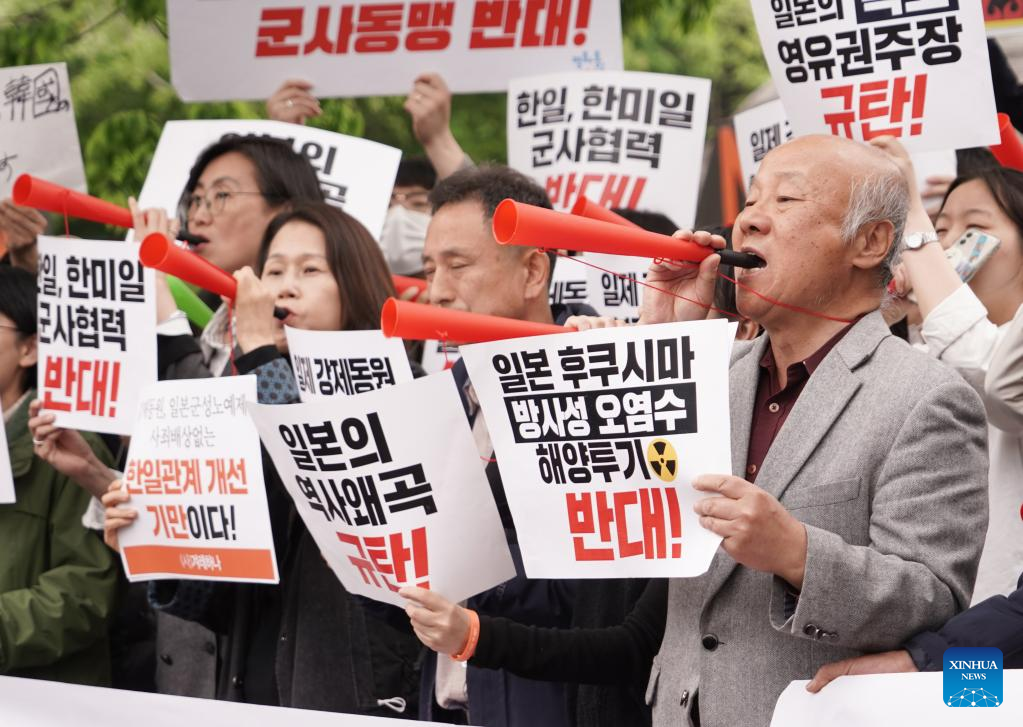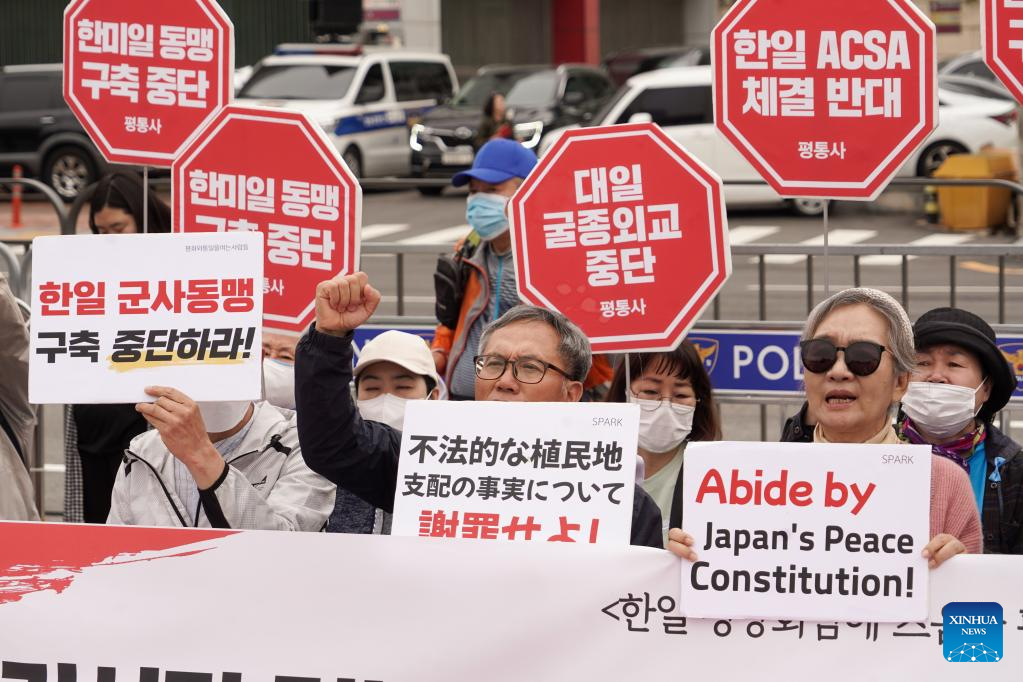
Protesters hold a rally against Japanese Prime Minister Fumio Kishida's visit to South Korea in Seoul, South Korea, May 7, 2023. Several South Korean organizations rallied here Sunday to protest Japanese Prime Minister Fumio Kishida's visit to South Korea. The protesters called for Tokyo's apology over its militarist past, opposed South Korea-Japan military cooperation, and demanded withdrawal of Japan's plan to discharge radioactive wastewater. (Photo by James Lee/Xinhua)
SEOUL, May 7 (Xinhua) -- Several South Korean organizations rallied here Sunday to protest Japanese Prime Minister Fumio Kishida's visit to South Korea.
The protesters called for Tokyo's apology over its militarist past, opposed South Korea-Japan military cooperation, and demanded withdrawal of Japan's plan to discharge radioactive wastewater.
A group of activists from the Solidarity for Peace and Reunification of Korea (SPARK) gathered near the South Korean presidential office in central Seoul, where Kishida held talks with South Korean President Yoon Suk-yeol.
"Japan should apologize for its illegal colonial rule and withdraw the Fukushima contaminated water discharge plan," the protesters chanted.
"The (South) Korean and Japanese governments continue to say, 'Let's move into the future with the historical issues covered up and unresolved. A righteous solution to the historical issues will be needed to move toward the future of genuine peace," Moon Ga-on, a college student, told Xinhua while attending the rally.
South Korea unveiled a proposal in March to compensate South Korean victims of Japan's forced wartime labor through a government-backed foundation financed by private-sector donations, which triggered strong backlash at home.
Forced labor victims and sex slavery victims, who were forced by the Imperial Japan into sex servitude for military brothels during World War II, have demanded that the Japanese government sincerely apologize for its wartime atrocities.
Kishida told a joint press conference with Yoon that his cabinet will continue to inherit the positions of previous cabinets as a whole in terms of historical perception, saying his heart ached over people who suffered hard and sad things.
His remarks could be difficult to soothe the victims as most of the previous Japanese cabinets failed to acknowledge its responsibility and make a sincere apology for the wartime brutalities.
Kishida's remarks that his heart ached were an expression of his personal and direct feelings for the people, indicating that it was not an official apology of the Japanese government.
With regard to Japan's plan to discharge tritium-laced wastewater from its crippled Fukushima Daiichi nuclear power plant into the Pacific this year, Oh Mi-jung, one of SPARK activists, told Xinhua that it will pollute the marine environment and threaten the lives and safety of people all over the world.
"Japan is a country that was devastated by atomic bombs in 1945 ... The plan to dump the radioactive contaminated water into the Pacific approved by the Japanese government, which is fully aware of nuclear and radioactive damages, will endanger the lives and safety of people around the world," the activist noted.
Ahead of Kishida's trip to Seoul, about 5,000 protesters held a candlelight rally in Seoul on Saturday night, opposing the Japanese prime minister's visit without an apology for historical issues.
They also called on Japan to abandon the tritium-laced water discharge plan, urging the South Korean government to stop its diplomacy obedient to Japan and the United States. ■

Protesters hold a rally against Japanese Prime Minister Fumio Kishida's visit to South Korea in Seoul, South Korea, May 7, 2023. Several South Korean organizations rallied here Sunday to protest Japanese Prime Minister Fumio Kishida's visit to South Korea. The protesters called for Tokyo's apology over its militarist past, opposed South Korea-Japan military cooperation, and demanded withdrawal of Japan's plan to discharge radioactive wastewater. (Photo by James Lee/Xinhua)
